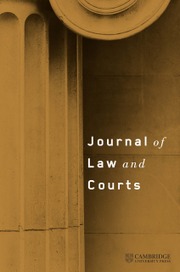Article contents
(Re)examining the Insurance Model of Judicial Independence across Democracies
Published online by Cambridge University Press: 21 October 2022
Abstract
Despite being a dominant explanation of judicial independence in democracies for over a decade, the “insurance” model has received little systematic attention. I argue that how we conceptualize democracy is especially important for analyses of judicial independence employing this insurance framework, demanding more careful attention from scholars. I illustrate that empirical results are contingent on specific conceptualizations by replicating the single existing study examining the insurance model across democracies globally. In doing so, I demonstrate that existing findings are largely driven by classifying electoral authoritarian regimes like Kazakhstan and Russia as democracies.
- Type
- Research Article
- Information
- Copyright
-
© 2018 by the Law and Courts Organized Section of the American Political Science Association. All rights reserved.
Footnotes
I would like to thank Tobias Heinrich, Kirk Randazzo, David Klein, and reviewers at the Journal of Law and Courts for helpful suggestions on earlier iterations of the article. I would further like to thank Aylin Aydın for sharing the data from her original article and for comments on an earlier draft. The data and code replicating all of the results in this article are available in a zip file.
References
- 2
- Cited by




